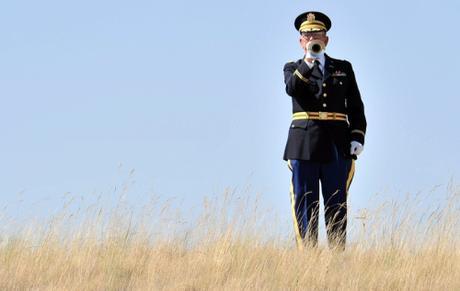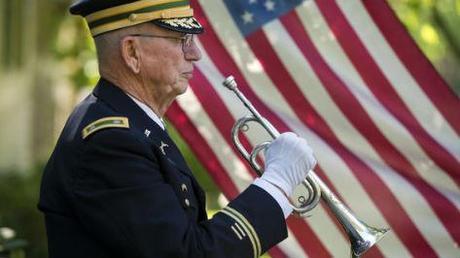
Lt. Col. Philip Kowzan/US Air Force Photo
Spokesman-Review: Taps is 24 notes that can make the toughest soldier cry. It’s a musical recognition of a life ended, a goodbye that hangs in the air as friends and family wipe their tears, look up and know they must live the rest of their lives without someone.
Since 2001, retired Army Reserve Lt. Col. Philip Kowzan, has played taps at military honor funerals in the Spokane area. His debut came unexpectedly at longtime friend Ivan Brayman’s funeral. “They had a recorder there and I said, ‘No, you’re not using that, not at my friend Ivan’s funeral,’ ” Kowzan said.
A lifelong trumpet player, he got his trumpet out of the car, took a deep breath and played for his friend one last time. “I wasn’t in uniform or anything,” Kowzan said. “I’m not even sure I did it right.” That was the only time he played taps in 2001.
But since then, he’s played at 1,259 funerals, sometimes playing at three services in the morning and another three in the afternoon. “I did seven one day,” Kowzan said. “That’s a lot.”
Every funeral Kowzan has participated in is meticulously recorded in a little black notebook, its cover worn from being carried in his pocket. When he ran out of notebook pages, he switched to a small three-ring binder.
He tries to get the funeral program and the obituary from each service, and he’s working on creating a leather-bound scrapbook that will be given to the Washington State Veterans Cemetery. “It’s become my mission,” Kowzan said, flipping through the pages of his notebook, recognizing many of the names.
At 77, Kowzan is long retired, first from the Army and then from a job with a whirlpool spa company.

He plays in several bands with his wife, Carol Kowzan, and has just picked up viola, so he wouldn’t mind slowing down his bugling career. It’s just that he knows of only three other bugle players. “Once in a while a new person shows up,” Kowzan said. “But we desperately need younger people.”
Kowzan doesn’t charge anything, though he doesn’t turn down a donation to cover gas and a sandwich for lunch. His spotless, well-fitting uniform cost him $500.
The Washington State Veterans Cemetery in Medical Lake pays him a $25 stipend – for a whole day. “It’s 23 miles out there, so if I have funerals in the morning and the afternoon, then I don’t go home,” Kowzan said, smiling.
Kowzan is not complaining, he’s just truly worried that battery-operated, digital bugles with built-in MP3 players will take over, leaving a sterile monotone presentation of a very emotional piece of music. “Sometimes the batteries die in the middle of everything,” Kowzan said. “It will never be the same as having a real live person play.”
Age has taken many of his fellow buglers away. “Perhaps people have become complacent?” Kowzan said. “They expect us to be there, but they don’t want to do it.”
Rudy Lopez, director of the Washington State Veterans Cemetery, said that Kowzan, Dave Halverson and Paul Manley form the primary group of buglers used by the cemetery. “He is a very giving individual, and he is passionate about taking care of veterans and their families,” Lopez said, adding that Kowzan was volunteer of the year in 2014.
According to the organization Bugles Across America – a nonprofit that supports buglers – anyone who can play the 24 notes of taps in a style that honors the veterans, their families and the burial detail can become a bugler. “We would love to have high school students join us,” Kowzan said. “They could do it as a community service project.”
Kowzan is the chairman of the Spokane Honor Guard and he said they, too, have dwindling ranks. Military honor guards are provided by veterans’ organizations like the Veterans of Foreign Wars.
VFW Post 1435 in Spokane Valley pulls honor guard members from all the VFW posts in the area, said member J.F. “Gunny” Goffinet. “To be in the honor guard you would have to have served in some form,” Goffinet said. “You should contact a veterans’ organization.”
According to www.military.com, eligible veterans are entitled to free military funeral honors, which consist of at least two members of the armed forces, one of whom represents the parent service of the deceased. The minimum service includes the folding and presenting of the American flag to the family and the playing of taps.
Kowzan is a purist when it comes to taps – he doesn’t like the echo version fancied by some. “It’s 24 of the most beautiful notes in the world,” Kowzan said. “No need to mess with that.”
He speaks with reverence of the famous cracked note at President John F. Kennedy’s funeral, a slight imperfection that showed the bugler’s emotion.
Being a bugler is a solemn and exposed job, Kowzan said. Standing at the gravesite, in the silence of the cemetery, there’s no one to hide behind as the funeral draws to an end and the bugler walks to the head of the grave.
A small man, Kowzan stands straight, loosens his shoulders, takes a deep breath and closes his eyes. “I see the notes as I play them, one at a time, up and down,” Kowzan said. “And I put them up there in the right place, just like you put cups away in a cupboard.”
We salute you, Mr. Kowzan.
DCG

